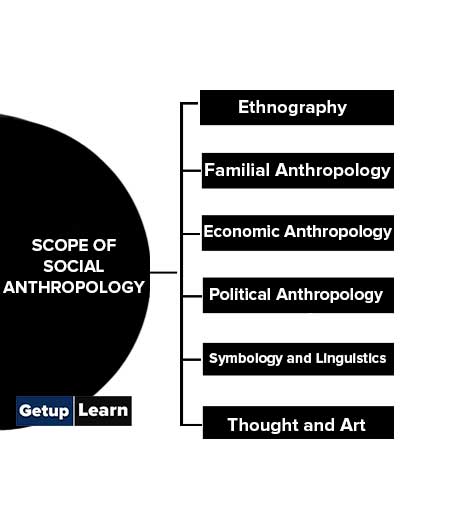Table of Contents
Social anthropology is the study of social behaviour, especially from the point of view of the systematic comparative study of social forms and institutions. In other words, social anthropology is a comparative study of social behaviour and social phenomena of men of all countries and ages.

Table of Contents
Social anthropology is an important branch of anthropology. Social anthropology is social. This meaning of the word ‘social’ is enough to show how the field and viewpoint of social anthropology are different from other branches of anthropology.
Physical anthropology and cultural anthropology are closely related. Different branches of physical anthropology have a close bearing upon the study of social anthropology, a branch of cultural anthropology. Again archaeology has been helpful in the study of various branches of physical anthropology.
Some definitions of social anthropology are as follows:
[su_quote cite=”Piddington”]Social anthropologists study cultures of contemporary primitive communities. This definition of social anthropology is a bit narrow because anthropology does not only study primitive cultures but studies contemporary cultures also. From this point of view, the definition of social anthropology given by S.C. Dubey is more appropriate.[/su_quote]
[su_quote cite=”S.C. Dube”]Social anthropology is that part of cultural anthropology that devotes its primary attention to the study of social structure and religion rather than material aspects of culture. It is clear that social anthropology studies the different aspects of social structure such as social events, social institutions and social relations, etc.[/su_quote]
[su_quote cite=”M.N. Srinivas”]Social anthropology is a comparative study of human societies. Ideally, it includes all societies, civilized, primitive and historic. Dr Srinivas has given a sufficiently detailed definition of social anthropology.[/su_quote]
While defining social anthropology, Beals and Hoijer write that “it is concerned with culture per se, whether it belongs to the primitive men of the stone age or the European city dwellers of today.” Although it is more properly a definition of cultural anthropology, it surely and clearly shows that the field of social anthropology is very wide.
It includes a study of different parts of culture, social institutions and economic and political administration. The main branches or scope of social anthropology are given below:
- Ethnography
- Familial Anthropology
- Economic Anthropology
- Political Anthropology
- Symbology and Linguistics
- Thought and Art

Ethnography
Ethnography is the main field of social anthropology. As is clear from its name, it studies the human race. Its scope also includes the study of cultures of different races.
Familial Anthropology
Familial Anthropology: Family is the basic institution of society. Social anthropology, therefore, studies the family also. Social anthropology is the branch of anthropology known as familial anthropology. It takes up a comparative study of the families of different societies and cultures. It studies the different types of families along with their progress.
A family is based on marriage. Familial anthropology, therefore, includes a study of different types of marriage. It also includes other blood relations along with marriage.
Economic Anthropology
Economic Anthropology: Economic rules play an important part in social organization. Some radical changes take place in social structure along with a change in economic administration. Social anthropology, therefore, Economic anthropology minutely studies the economic administration of primitive and civilized human societies and of different levels of evolution in them.
Political Anthropology
Political anthropology has also an important place in social structure along with economic administration. Social anthropology, therefore, studies all types of political administration, governments, laws, rules of punishment, etc. This branch of social anthropology is known as political anthropology.
Symbology and Linguistics
Symbology and Linguistics: the study of different symbols of human behaviour, which are current n languages of different societies, supplies many important facts for the study of society. Social anthropology, therefore, studies all these also. The whole linguistic field falls within this branch of social anthropology.
The main branches of linguistics are given below:
- Descriptive Linguistics: it studies the individual and regional languages.
- Historical Linguistics: It s a historical study of languages.
- Comparative Linguistics: It studies the comparative fact about language.
- Common Linguistics: It studies the difference between the minimum and maximum roots of some languages.
Thought and Art
Thought and Art: The study of thoughts in the theoretical study s very important. Thought includes religion, magic, science and even legends. Social anthropology is a comparative study of all these things in ancient human society. Art is an important part of culture and culture depicts the interior of society.
Social anthropology studies sculpture, metallurgy, and even dancing and instrumental and vocal music.
Social anthropology is a science and to know this fact, it is necessary to understand what is science. Some begin to consider a particular subject matter to be a science like chemistry or engineering etc. common people distinguish between science and art in this very sense.
These are the nature of social anthropology given below:

An examination of social anthropology, on the basis of the aforesaid six rudiments, reveals that social anthropology possesses all the essential elements of science:
- Social Anthropology makes use of Scientific Method
- Social Anthropology is Factual
- The Principles of Social Anthropology are Universal
- The Principles of Social Anthropology are Veridical
- Social Anthropology defines Cause-effect Relations
- Social Anthropology can Predict
-
Social Anthropology makes use of Scientific Method: All methods of social anthropology are scientific. They make use of scientific techniques like schedule,, participant observation, historical procedure and case history, etc. First of all, they gather facts through observation.
Then they are recorded in an orderly form. Afterward, this matter is classified and in the end, common principles are made on the basis of accepted facts. The validity of these principles is examined.
-
Social Anthropology is Factual: Social anthropology is a comparative study of the facts about social events, relations and reactions. Participant observation is its main method. In this method, an anthropologist goes to live among those people whom he has to study. Thus his study is in accordance with facts.
-
The Principles of Social Anthropology are Universal: the rules of social anthropology are proved in all countries so long as the circumstances are the same; there is no chance of an exception in them.
-
The Principles of Social Anthropology are Veridical: thus the principles of social anthropology always prove true on verification and even on re-verification. Their validity can be verified b anybody and at any time.
-
Social Anthropology defines Cause-effect Relations: social anthropology discovers cause-effect relations in social facts, events and relations, etc. for example, an anthropologist after his comparative study of various cultures tells us about life style to be found in a particular culture and the extent to which the lifestyles undergo a change with culture changes. Thus, social anthropology answers ‘what’ along with ‘how’.
-
Social Anthropology can Predict: On the basis of the cause-effect relationships, social anthropologists can guess the future and can predict social reactions and events, etc. he can decide ‘what will be” on the basis of ‘what is’ after knowing the cause-effect relations.
It is clear from the aforesaid discussion of the nature of social anthropology that social anthropology is a science. It contains an abstract form of thoughts. Scientific study is possible only through abstract forms. The rules of these abstract forms decide the reactions of concrete things.
In this way the rules of social anthropology are universal and veridical in practical shape. Social anthropology has brought revolutionary change in the notions of psychologists, sociologists, politicians and social reformers, has given a hope for organization of human society in future and has presented useful suggestions to decide pattern of its organization.
The scientific method is a systematic study of a subject matter within a limited scope. This method requires great patience, courage, hard labour, constructive imagination, and objectivity. No man can utilize a scientific system without a scientific notion, before starting work on a scientific system; a research scholar should minutely define the problem which is the subject of his research.
The clearer is the definition the easier shall be the work of research. The main steps of the scientific method are given below:
Observation
The first step in the scientific system is to observe the subject matter of research minutely and carefully. This observation often needs the help of the instruments. These instruments must be exact.
Recording
The second step needed in the scientific system is to record this observation carefully. Impartial objectivity is very essential in doing it.
Classification
Then the classification and organization of the collected material will have to be done. It is a very serious step. In the words of Karl Pearson, “The classification of facts, the recognition of their sequence and relative significance is the function of science”.
The classification is done in such a way that relation and semblance in the scattered elements may be seen. Thus the subject matter is arranged on logical grounds.
Generalisation
The fourth step in a scientific system is to find a common rule or to generalize on the basis of semblance in the classified matter. This common rule is called a scientific principle. In the words of MacIver, “such a law is simply another name for a carefully described and uniformly recurring sequence of conditions”.
Verification
A scientific system does not stop after making generalizations. The verification of these generalizations is also necessary. Scientific principles can be verified and such verification is their necessary condition without which they cannot be called scientific.
The aim of any science is to study a specified part of the real world and from a study of facts to formulate theories which shall serve as recipes for human conduct, whether that conduct be the carrying out of further research or the taking of practical steps for the promotion of human welfare.
The most important aims of social anthropology are the following:
- The Study of Primitive Culture in its Present Form
- The Study of Cultural Contact and Specific Processes

The Study of Primitive Culture in its Present Form
The primary aim of Social anthropology is to gather information about human nature. Human nature is a controversial subject. Different scholars have laid emphasis upon different aspects of human nature. The primitive man and society present human nature in its most rudimentary and raw form.
Therefore their study is useful for the understanding of the basic essentials of human nature without much influence of culture upon them.
The Study of Cultural Contact and Specific Processes
Another aim of Social anthropology is the study of the processes and results of cultural contacts. Most of the primitive societies are gradually coming in contact with more developed cultures. This contact is gradually creating social, religious, economic and political changes and disorganization.
The administrators and the social planners require the help of social anthropologists in the understanding of processes and consequences of cultural contacts.
According to the Royal Anthropological Society of Great Britain and Ireland the most important aims of Social anthropology are the following:
- The study of primitive culture in its present form.
- The study of cultural contact and specific purposes. This includes the exploration of the influences of outer groups creating cultural changes.
- Reconstruction of social history.
- Search for universally valid social laws.
The above aims of Social anthropology are particularly evident in the utilization of functional method in its study. According to Malinowski, in the functional method, we try to discover those human needs which maintain his bio-psychic existence and finally his higher intellectual survival.
YOU MIGHT ALSO LIKE
- What is Anthropology?
- Branches of Anthropology
- What is Social Anthropology?
- Scope of Social Anthropology
- Nature of Social Anthropology
- What is Social Cultural Anthropology?
- Theories of Sociocultural Anthropology
- What are Archaeological Sites?
- Types of Archaeological Sites
- What is Linguistic Anthropology?
- What is Marriage?
- Types of Marriage
- What is Family?
- Types of Family in Sociology
- Functions of the Family
- Folk literature
- What is Biological Anthropology?
- Biological Anthropology Fields of Study
- What is Social Anthropology?
- Definition of Social Anthropology
- Scope of Social Anthropology
- Nature of Social Anthropology
- What is archaeology?
- What is Archaeological Anthropology?
- Process of Archaeology
- Types of Archaeology Sites
- Linguistics Language
- Linguistic Culture
- Types of Marriages
- What is Kinship?
- Types of Kinship Groups
- What is Folkloristic Anthropology?











